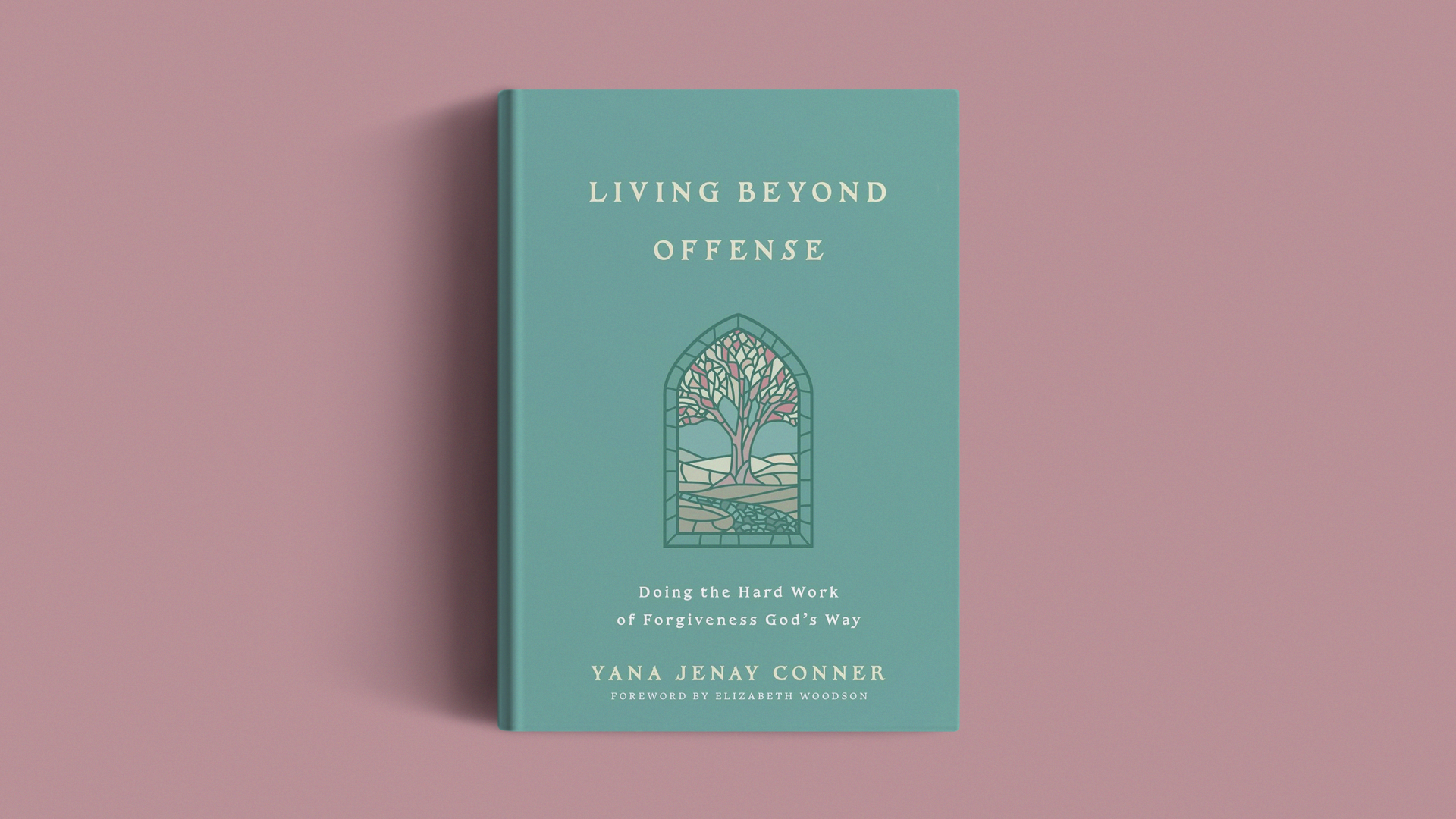The pages of Scripture are soaked with forgiveness. In book after book, the Bible traces God’s redemptive plan to forgive those who repent of their sins and place their faith in him. As people who have been freely forgiven through the work of Christ, we are to reflect our heavenly Father by forgiving those who sin against us.
But many times, forgiving is easier said than done. It’s more lovely to hear about God casting our sins into the sea of forgetfulness than to extend that type of grace to those we find at fault. Those who have been walking with God for a while may be able to forgive small offenses without much strain. But when bigger tests inflict deep wounds on the heart, forgiveness may only be offered over a tear-soaked Bible through gritted teeth.
Living Beyond Offense: Doing the Hard Work of Forgiveness God's Way
Harvest House Publishers
240 pages
Bible teacher Yana Jenay Conner wants to help guide Christians through what to do after offense has been served to us on a platter. In Living Beyond Offense: Doing the Hard Work of Forgiveness God’s Way, Conner takes readers through her own journeys of forgiveness and offers a helpful blueprint that disentangles the topic from its close cousins, reconciliation and trust.
The author is quick to say that she sees herself not as an expert but a “fellow weary traveler” attempting to shine the light of Christ in the wilderness of suffering. Conner’s suffering included an 11-year journey of forgiving and ultimately reconciling with her once-absent father, who struggled with alcoholism. His absence led to suppressed feelings that went unaddressed for years, Conner writes, and culminated in a fear of abandonment that infected her other relationships.
Conner knew God was calling her toward forgiveness, but she didn’t entirely understand why she should forgive or how. She sets out to address both questions in a way that’s accessible to readers encountering the topic for the first time and still insightful for those who need a refresher.
As with any good exegete, Conner builds the foundational pillars of her book from the Scriptures. Sin warped God’s creation and marked our relationships with what Conner calls “self-conscious, self-centered self-preservation.” Christ came to reshape us into peacemakers who mirror him (Matt. 5:9) through “self-giving, others-centered sacrificial love.”
Christ’s version of shalom (Hebrew for “peace” or “wholeness”) is revealed not just in fixing our enmity with God or the fractures in our societies, she writes, but also in living in relationship with each other. What we see today, however, are people who are shalom avoidant or shalom demanding.
Those in the first group, Conner writes, run away from uncomfortable situations and seek the absence of conflict, as with the person who ghosts a dating partner when it’s time to define the relationship. The second group is focused on settling debts and holding real or perceived offenders to account (the impetus behind cancel culture).
Some readers might quibble with the labels, but I thought the categories were a helpful and accurate description of personality types and cultural attitudes.
Conner correctly identifies both approaches as harmful and presents the biblical case: Forgive offenders of their debts, practice mercy, and choose not to retaliate, knowing that God, the ultimate judge, will avenge all wrongdoing and execute justice.
Our culture often pits forgiveness against justice, casting the former as a weakness that evades accountability. Biblical forgiveness which is offered freely is not a license to abuse, nor is it the denial of justice. However, it does force us to trust in God and his plan—and his promise to accomplish it according to his righteous wisdom.
Conner calls on readers to “humbly confront” offenders (Matt. 18:15–17) and seek to restore damaged relationships with the awareness that true reconciliation is shared work between different parties, not one person trying to glue broken pieces back together. Forgiveness is for everyone. But “reconciliation is for the repentant few,” she writes.
The author stands on solid theological ground for most of the book, but I was not convinced by one of her interpretive moves. In her explanation of Jesus’ command to turn the other cheek, she says it’s more than a command to forgo retaliation.
“He is commanding them to humbly confront their offender by inviting them to reexamine the hierarchy they’ve created in their mind and to treat them as a fellow image-bearer,” Conner writes.
“While they would get slapped again, at least this time, with their right cheek protected, it would be an openhanded slap among equals” instead of a “backhanded slap” that would be deemed highly offensive in the Jewish honor and shame culture.
Conner’s interpretation of the text mirrors the one employed by some theologians including the scholar N.T. Wright. But since there is no distinction between a front hand and a backhand slap in the biblical text, I felt it required more argumentation than the book provided.
In another section of the book, Conner surprisingly pushes back on the idea of forgiving for the sake of internal freedom. Though the adage “Forgiveness is a gift you give yourself” is true in many ways, she accurately notes that the Bible’s primary encouragement to forgive comes from the fact that we as believers have been forgiven and in turn should forgive others (Eph. 4:32).
The book is compassionate toward survivors of abuse, and Conner notes that she has counseled such individuals. For those on their own tender journeys of forgiveness, she recommends a counselor or trustworthy resources that can provide tools of support.
But she also notes the extent to which therapy-speak (words like toxic, narcissistic, trauma) has infiltrated our culture, and she gives a much-needed call to discern between abuse and human-inflicted hurt that doesn’t cross that line. Furthermore, she exhorts readers to do the introspective work of figuring out when a perceived offender has run afoul of God’s commandments versus our own preferences and desires.
Being a “shalom-maker,” as Conner calls it, is challenging. After we say, “I forgive,” feeling forgiveness can be tough, especially when memories of the offense pop up again and again.
In my own life, forgiveness can feel incomplete until I pray for the offender—in some cases, repeatedly, until every taste of bitterness is washed away. I wish Conner spent a little more time on this area. But she does a respectable job of laying out the different ways God helps us in the journey: through his Word, his Spirit, and the counsel of Spirit-filled believers.
Overall, the book is an excellent guide that teaches readers how to navigate their own forgiveness journeys while looking to the author’s example.



















